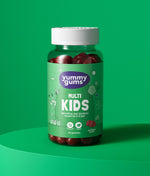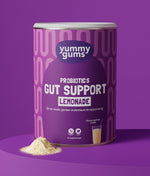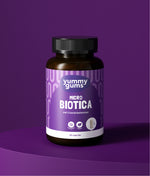Pregnancy vitamins. What you need to know!
Vitamines
Table of contents
Extra vitamins when trying to conceiveBefore delivery
After giving birth
What are prenatal vitamins?
Fat- and water-soluble vitamins
Recommended intake
Folic acid (vitamin B11)
Vitamin D
Iodine
Beta-carotene
Choline
Vitamin B2
Vitamin B3
Vitamin B5
Vitamin B6
Vitamin B12
Vitamin C
What should I look for when buying vitamins?
Medical advice
Instructions for use
Bibliography
Extra vitamins when trying to conceive
Vitamins and minerals support a wide range of processes in your body, such as energy production, digestion, and immune system function. During, after, and even before pregnancy, your body needs more of some vitamins and minerals. For example, the Health Council recommends taking a daily supplement (400 micrograms) of folic acid if you're trying to conceive. Folic acid plays a role in placental development and cell division. Fetal cell division begins almost immediately after conception, when you don't yet know you're pregnant. Having high folic acid levels before conception ensures optimal development of your baby. Therefore, the Nutrition Centre recommends taking a daily supplement of 400 micrograms of folic acid until the 10th week of pregnancy. Yummygums Mommy contains all the vitamins your body needs before, during, and after pregnancy and can help you with this. Yummygums Mommy is a delicious papaya-flavored vitamin gummy with 15 vitamins, including folic acid and vitamin D3, which support your body and your baby's development.
* Yummygums Mommy is now available in our webshop !Before delivery
Whether you're trying to conceive, pregnant, or recovering from childbirth, your body needs a higher dose of vitamins and minerals than usual. This requires a healthy lifestyle and nutritional intake, but in practice, this isn't always feasible. Because your body needs specific amounts of certain vitamins, it's nearly impossible to get them all through food. Supplementing your daily diet is a good way to ensure you and your baby get enough nutrients—even if you're experiencing nausea. Yummygums Mommy is a vitamin gummy designed for expectant and breastfeeding mothers.After giving birth
After giving birth, your body needs time to recover from both the birth and the pregnancy. Your energy levels may already be somewhat lower, especially if you sleep short nights. Vitamins B1, B2, B3, B5, B6, B8, B12, and vitamin C help your body release energy from your food and boost your immune system. When you breastfeed, you lose some of your nutrients through breast milk. If you don't get enough nutrients yourself, this doesn't initially affect the composition of your breast milk, but your own body's. To maintain your own health and promote recovery, you therefore need more vitamins and minerals during breastfeeding.
What are prenatal vitamins?
The increased requirement doesn't apply to all vitamins and minerals. Your body needs higher doses of certain substances before, during, and after pregnancy. This refers to the following vitamins and minerals, which are described in more detail later:
- Taking folic acid (vitamin B11) is beneficial for women trying to conceive. Folic acid contributes to the formation of the placenta and the baby's overall growth. The composition of Yummygums Mommy is therefore based on this guideline. It is recommended to start taking folic acid supplements at least one month before conception and continue until the tenth week of pregnancy.
- The Health Council recommends taking 10 micrograms of vitamin D daily when you're pregnant. Vitamin D helps with cell division and contributes to tissue development. Your body needs vitamin D to support both your baby's bone development and to keep your own bones strong.
- Iodine is essential for children's growth. It plays a significant role in the functioning of the nervous system and contributes to metabolism.
- Beta-carotene is converted into vitamin A in the body. Vitamin A is good for the immune system and important for iron levels in the blood. Women are regularly warned about the risks of excessive vitamin A doses during pregnancy. Therefore, Yummygums Mommy contains the provitamin beta-carotene to eliminate these risks.
- Choline contributes to the maintenance of the structure of cell membranes and supports normal lipid metabolism.
- Vitamins B2, B3, B5, B6, B12, and C help reduce fatigue. This can help you if you sleep poorly and feel tired during pregnancy.
Fat- and water-soluble vitamins
Vitamins can be divided into two groups: water-soluble and fat-soluble. Vitamins A, D, E, and K are fat-soluble vitamins. Fatty fish, oil, and nuts are foods rich in these vitamins. Water-soluble vitamins are mainly found in foods like vegetables, fruits, and grains. Your body can partially store fat-soluble vitamins, allowing you to build up a small supply. Your body cannot store water-soluble vitamins. If you consume too much of these vitamins, you simply urinate them out (Eigen kracht, 2019).
Recommended intake
To understand the vitamins and minerals mentioned above, it's helpful to know the amounts you need. The RDA, AI, and tolerable upper intake levels are used for this purpose. These are explained below:
ADH
Based on research, the Health Council indicates the daily amount of each nutrient healthy people need. Various terms are used for this, the most common of which is the recommended daily allowance ( RDA ). Some groups require a higher dose of certain vitamins or minerals than the RDA. Vitamin supplement labels often state "so much % of the RDA" or "so much % of the RI (reference intake). The reference intake can be compared to the RDA.
Adequate intake
The adequate intake ( AI ) is an estimate of the minimum amount of a nutrient you should consume daily. This term is used when an RDA cannot yet be determined and is therefore not a target value, but an estimate of the lowest dose you need to stay healthy.
Acceptable upper limit
A deficiency of certain vitamins and minerals can make you feel unwell, but too high a dose can also be detrimental to your health. Therefore, a tolerable upper intake level has been established for each nutrient: the maximum intake of a nutrient without causing adverse health effects. A different indicator applies to substances that do not occur naturally in food but are added to it. The maximum amount you may consume of these substances without adverse health effects is indicated by the acceptable daily intake ( ADI ). Examples include E numbers, veterinary medicines, and pesticides.
Folic acid (vitamin B11)
Vitamin B11 is necessary for a properly functioning nervous and immune system, contributes to cell division during growth, and other processes. Folic acid plays an important role during pregnancy because high folic acid levels (folate status) in the mother's body reduce the risk of birth defects in the baby. The amount of folic acid needed to increase your folate status is impossible to obtain entirely from food. Therefore, taking a folic acid supplement is recommended for women who are trying to conceive, are pregnant, or are breastfeeding.
Recommended intake
The recommended daily allowance ( RDA ) of folic acid for adults is 300 micrograms. For women trying to conceive, pregnant women, and breastfeeding women, a daily intake of 400 micrograms is therefore recommended. Because your body cannot produce folic acid itself, it is important to get enough folic acid through food or supplements.
Power supply
Vitamin B11 can be found in the following foods:
- vegetables, especially beets and broccoli
- oranges
- lentils
- brown beans
- fruit
- whole grain products
Vitamin D
Your body needs vitamin D to keep your bones and teeth strong. Vitamin D helps calcium and phosphorus be absorbed and stored in your bones and teeth. Calcium helps build and maintain a strong skeleton, which is especially important during pregnancy, for both you and your baby. Vitamin D is also essential for a healthy immune system and plays a key role in muscle function.
Recommended intake
The general guideline for daily vitamin D intake is 10 micrograms. Certain groups absorb less vitamin D, such as people with a tan or dark skin tone, people who don't spend much time outdoors, and people who wear a veil. They are advised to get an additional 20 micrograms per day through a supplement. The Health Council recommends an additional 10 micrograms of vitamin D daily, in addition to the amount you get from food. During and after pregnancy, you don't necessarily need a higher amount of vitamin D, but because a deficiency carries risks, the Health Council recommends taking a supplement to be on the safe side (Royal Dutch Organisation of Midwives, 2013).
Power supply
Vitamin D can be found in these foods:
- oily fish (eel, salmon, mackerel)
- eggs
- butter
- Vitamin D is added to margarine, half-fat margarine and baking and frying products.
Iodine
Iodine is essential for the production of thyroid hormones. Thyroid hormones are essential for growth, healthy metabolism, and the development of the nervous system. Iodine also supports energy production.
Recommended intake
The Health Council has not established recommended dietary allowances for iodine. In 2012, guidelines for an RDA were established in Scandinavia, which are now also used in the Netherlands: the RDA for iodine from age 9 is 150 micrograms. Pregnant and breastfeeding women are recommended a higher dose of 175 micrograms and 200 micrograms, respectively.
Power supply
These foods are high in iodine:
- bread, baked with baker's salt
- sea fish
- eggs
- dairy products
Beta-carotene
Beta-carotene (provitamin A) is converted into vitamin A by your body. Vitamin A supports good immunity and is very important for vision, as well as healthy bones, teeth, skin, and growth. Fortunately, your body is clever enough to convert exactly the amount it needs. By taking beta-carotene in a supplement, you can avoid getting too much vitamin A from it. During pregnancy and breastfeeding, your body has an increased need for vitamin A.
Power supply
Beta-carotene is found in:
- dairy products
- egg yolk
- carrots
- smoked eel
Recommended intake
There is no recommended daily allowance ( RDA ) for beta-carotene. Due to negative reviews, some women avoid vitamin A completely. Because vitamin A is good for your immune system, vision, and important for healthy iron levels in the blood, avoiding it is not advisable.

Choline
Choline is a semi-vitamin added to baby food and naturally present in breast milk. Newborn babies do not yet produce this substance themselves, or do not produce it in sufficient quantities. Choline is a component of cell membranes and plays a role in several metabolic processes.
Recommended intake
The Health Council has established an adequate intake of 400 milligrams/day for adults, as a guideline for how much you should consume daily. This amount should not be used as a target value, but rather as a guideline for approximately how much you need. Due to limited research, the Health Council has not yet been able to establish a recommended daily allowance for choline.
Power supply
Choline is found in many foods, especially in:
- milk
- eggs
- peanuts
Vitamin B2
Vitamin B2 plays a role in maintaining the nervous system, digestion, and energy metabolism. It is important for healthy skin and vision, and contributes to the protection of cells from oxidative damage.
Recommended intake
The recommended daily allowance ( RDA ) of vitamin B2 for adults is set at 1.6 milligrams.
Power supply
Vitamin B2 is found in the following foods:- dairy
- meat(products)
- vegetables
- fruit
- grain products
Vitamin B3
Vitamin B3 plays a vital role in cell energy supply and fatty acid production. It's also important for the proper functioning of the nervous system and contributes to healthy skin.
Recommended intake
The recommended daily allowance ( RDA ) of vitamin B3 for adult women is 13 milligrams, for men it is 17 milligrams.
Power supply
Vitamin B3 can be found in these foods:
- meat
- poultry, such as chicken and turkey
- fish, especially tuna
- nuts and seeds
- peanuts
- grain products
Vitamin B5
Vitamin B5 supports the breakdown of proteins, fats, and carbohydrates and contributes to energy production. Vitamin B5 is important in the formation of several hormones and supports the functioning of the nervous system.
Recommended intake
There isn't yet enough scientific evidence to establish a recommended daily allowance for vitamin B5. However, the Health Council has established an adequate intake of vitamin B5 for adults at 5 milligrams. Don't consider this amount a target value, but rather a guideline of approximately how much you need.
Power supply
These foods are rich in vitamin B5:
- meat, especially chicken and beef
- eggs
- legumes
- dairy products
- vegetables & fruit
- whole grain products
Vitamin B6
Vitamin B6 is primarily responsible for the breakdown and synthesis of amino acids, the building blocks of proteins. It is also important for immune function, digestion, and metabolism. Vitamin B6 is involved in the production of red blood cells and is necessary for the proper functioning of the immune system.
Recommended intake
The recommended daily allowance ( RDA ) of vitamin B6 for adults is set at 1.5 milligrams.
Power supply
You can find vitamin B6 in the following foods:
- meat, especially pork fillet
- eggs
- (coal)fish
- walnuts
- whole grain products
- potatoes
- legumes
Vitamin B12
Vitamin B12 is essential for the production of healthy red blood cells. Red blood cells transport oxygen through your blood. Vitamin B12 is necessary for the proper functioning of the nervous system, for strong immunity, and contributes to energy production.
Recommended intake
The recommended daily allowance ( RDA ) for vitamin B12 for adults is 2.8 micrograms. Because the active form of vitamin B12 (the form that can be absorbed by the body) is only found in animal products, it's important for vegans to take a B12 supplement with a significant dose relative to the RDA. People who eat (predominantly) vegetarian diets are also advised to monitor their vitamin B12 intake closely.
Power supply
Vitamin B12 can be found in:
- dairy products
- eggs
- fish and meat
Vitamin C
Vitamin C is best known for its ability to support immunity. It functions as an antioxidant, meaning it protects body cells from damage caused by free radicals. Free radicals are aggressive substances that can sometimes damage cells and tissues. They play a role in the aging process.
Recommended intake
The recommended daily allowance ( RDA ) of vitamin C for adults is 75 milligrams. Your baby's development requires a lot of energy from your body, in addition to pregnancy-related ailments , poor sleep , and reduced exercise. Together, these factors often contribute to pregnant women's lowered immune system.
Power supply
These foods are rich in vitamin C:- fruits, especially citrus fruits and berries
- vegetables, especially cabbages
- potatoes
What should I look for when buying vitamins?
It's advisable to critically review a supplement's label before purchasing it. Check that the recommended dosage doesn't contain 4000 percent of the RDA, for example. Furthermore, more expensive doesn't necessarily mean better: your body won't notice any difference between vitamin B8 from a cheaper supplement and vitamin B8 from a more expensive one. A good reason for a price difference, however, is that different raw materials or additives are used. Furthermore, the selection of name brands is often larger than that of store brands (Consumentenbond, 2019).
Medical advice
If you eat a healthy and varied diet according to theWheel of Five , you'll get enough vitamins and minerals. However, in practice, this often proves to be much more difficult. If you want to check how many vitamins you're getting, use the online food diary "My Food Meter" from My Nutrition Center . It's also important to adhere to the guidelines established by the Health Council, without exceeding the tolerable upper intake level (Vitamin Information Bureau, 2019). Consult your doctor before taking vitamin supplements if you are pregnant, taking medication, or have a medical condition.
Instructions for use
Yummygums Mommy contains carefully calculated amounts of the vitamins and minerals described above, thus supporting your immune system during and after pregnancy. The recommended dose is two Mommy gummies per day, which you can take together without water. Yummygums Mommy has a fresh, sweet papaya flavor. When using Yummygums Mommy, it is not necessary to take Yummygums Multi Plus.






































